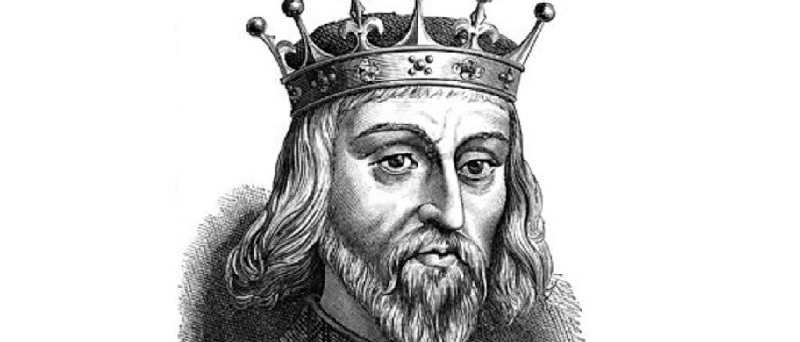Henry II of England
Posted on 4th January 2021
Henry was born on 5 March 1133, to Geoffrey of Anjou and Empress Matilda (daughter of King Henry I of England) in Le Mans, France. He was the grandson of King Henry I and known by many names including Henry Curtmantle, Henry FitzEmpress and Henry Plantagenet.
Henry spent his early years in his mother’s household and accompanied her to Normandy in his youth where he also received some education. In 1142, his father sent him to live in the household of Roger of Worcester, where he was further educated. He then returned to Anjou around 1144 to receive extensive education under the tutelage of William of Conches.
Following the deaths of his grandfather in 1135 and his father in 1151, Henry received a vast inheritance including Anjou and Maine in France, the Duchy of Normandy and later after his marriage to Eleanor of Aquitaine, the Duchy of Aquitaine and Poitou. He was to own more of France then any monarch before him.
He also laid claim to the English throne in 1153 and was finally crowned Henry II of England on 19 December 1154 at Westminster Abbey.
Reign 1154 - 1189
Before Henry became King, in 1152 he married Eleanor of Aquitaine, only eight weeks after her first marriage to King Louis VII of France was annulled. She had failed to give Louis a son, which forced him to annul the marriage and her subsequent marriage to Henry caused friction between Henry and Louis for the rest of Henrys life.
Henry and Eleanor’s marriage produced eight children, five sons and three daughters, however he was not an honourable husband and also produced many illegitimate children.
Henry had a desire to restore the lands of his grandfather Henry I and during the early years of his reign he restored the administration in England, and invested money and time in the construction and renovation of royal buildings.
He also obtained an agreement with King Malcolm IV of Scotland which resulted in the restoration of Cumberland, Northumberland and Westmorland to English rule, also forming a further agreement with Wales.
Henry believed the barons held too much power and after becoming King he reduced their powers, making himself unpopular. In 1166 he also introduced trial by jury.
Henry fought constantly with Louis VII during his reign, and Louis was to support Henrys sons in their rebellion against their father. Henrys wife Eleanor and her son Richard led a civil war against Henry in 1173, but this was crushed. Henry could not satisfy his sons desire for land and power and his son rebelled again in 1183.
A major event during Henrys reign was his relationship with Thomas Becket. They had held a long and successful relationship with Becket being his chancellor for many years, however following Beckets elevation to Archbishop of Canterbury in 1162, the relationship soured.
Henry wanted to reassert his rights over the church and thought Becket would support him, but this backfired when Becket became a staunch supporter of church rights. Over time the arguments between Henry and Becket increased. They were both strong willed people and unlikely to back down. This led to Becket fleeing to the French court of Louis VII in 1164.
Finally, the Pope had to intervene in the disagreement, forcing Henry into negotiation with Becket, and they agreed terms in July 1170, with Becket returning to England in December of that year. Becket, however was not to stick to the agreement.
This forced Henry to send four Knights to Canterbury to arrest Becket, but he refused to be arrested by such low-born Knights, and they hacked him to death instead on 29 December 1170.
This death horrified Christian Europe, and Becket was declared a martyr in death.
Much of Henrys later reign was spent in dealing with the revolts of his own children, and also the manipulative new King of France Philip Augustus.
The relationship between Henry and Richard dissolved into violence again in 1188 and 1189, with Richard having the support of Philip Augustus.
Henry was already suffering from a bleeding ulcer at the time of this violence, and he collapsed into a fever and died on 6 July 1189.
Although his wish was to be interred at Grandmont Abbey in the Limousin, he was instead buried at Fontevraud Abbey, near Chinon, Anjou, France.
Tagged as: Junior Middle Ages
Share this post:





